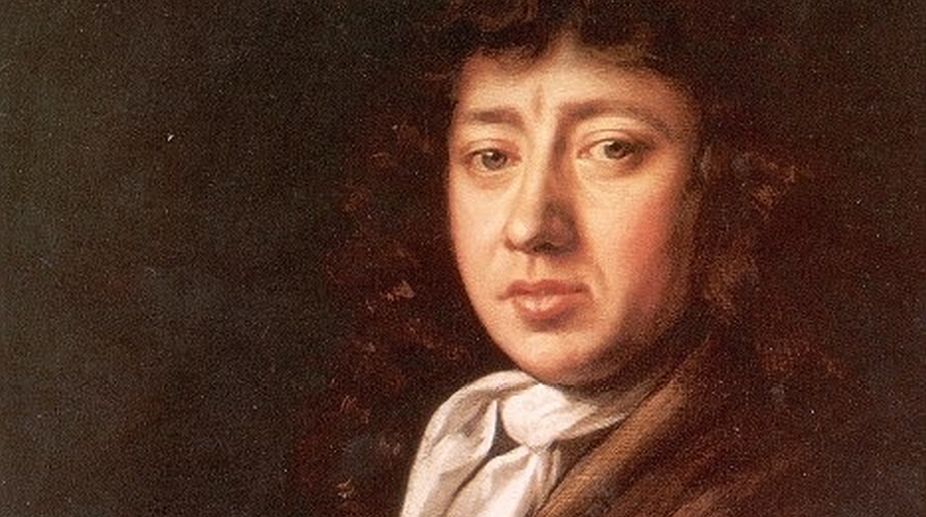The shock of destruction
The particularly strange sense of spectacle that accompanies the modern destruction of landmarks means the moment can be eternally replayed, as images become iconic.

Samuel Pepys (Photo: Facebook)
One ponders over the profession of England’s world famous diarist, Samuel Pepys, who lived from 1633 to 1703; a personality who also chronicled London’s Great Plague in 1665-66; The Great Fire of London in 1666, and his own observations of life from 1660 to 1669. His famous work, The Diary of Samuel Pepys was published in 1825.
The original diary is preserved in Magdalene College, Cambridge. Pepys, as a matter of fact, was a busy individual and he had other responsibilities. He was a Member of Parliament and Chief Secretary of the Admiralty. Despite him having no maritime experience; he achieved the designation of Chief Secretary due to his diligence and application of mind in naval matters. His diary became an important source of reference for the English Restoration period, especially due to Pepys’ eye witness accounts.
The world’s 26th most translated novelist and poet, Robert Louis Stevenson had written a vivid introduction to Pepys’ Diary, giving the unusual publication an understanding of Pepys’ character. He enjoyed good food with wine and when bored while listening to a sermon in Church, did not hesitate to look intently at an attractive lady seated near him.
Advertisement
Stevenson’s erudite interpretation of Pepys’ character has added a delightful charisma to this unforgettable diarist. Pepys wrote with candour and so his writing appealed to readers, from the initial entries of the Diary, when blaming “ the madness of the House of Commons,” to another observation, on the same day, when Pepys proceeds “to the Strand to my book-seller’s and there bought an idle, rogueish French book, Les Choile des Filles, which I have bought in plain binding, avoiding the buying of it in better binding, because I resolve, as soon as I have read it, to burn it, that it may not stand in the list of my books, nor among them to disgrace them.”
Stevenson interprets a very apt reflection on Pepys’ honesty and writes, “But what about the man, I do not say who bought a rogueish book, but who was ashamed of doing so, yet did it, and recorded both the doing and the shame in the pages of his daily journal?” This remarkable quality is elaborated in yet another personal matter, when Mrs Pepys wrote separately about complaints against her husband. Pepys scared that the world may read it, destroys the document and then incredibly, writes the story “with unsparing truth.”
Pepys describes his peccadilloes, or his silly and harmless misdeeds, and tells us through his Diary, with characteristic honesty, when he repents. “Although not sentimental in the abstract, he was sweetly sentimental about himself,” wrote Stevenson, who affirms that Pepys’ Diary “is a work of art.” No matter how evil Pepys’ thoughts may have been, he never suppressed his true self. As a character, he was therefore respected the same way Shakespeare respected the hesitation of Hamlet or Lady Macbeth. It was in the same manner that Stevenson respected Pepys, and admitted that the diarist’s faults were “so petty that I am ashamed to name them.”
The whole world, including Pepys’ wife, maid, two dogs, a pet eagle, a canary and a black-bird which whistled, was to Pepys a Garden of Armida, with the delights of paradise. He learnt how to sing, “Humming to myself which is now my constant practice, the trillo.” A trillo is the repetition of a single pitch of a musical note. He continued his enthusiasm for music and learned to play the flute, lute and theorbo (similar to a lute with an extension). He learned the style of a seaman’s song and improved his “rusty” Latin grammar, which he studied like a “schoolboy.”
Pepys records his reading Descartes and Aristotle, learning about timber, hemp, mathematics and accounting. He wrote in neat handwriting and ensured that capital letters were in red ink. He anticipated a “supper party”, which he described as “a glut of pleasure,” and when in possession of a new watch, he could not help, “seeing what o’clock it was a hundred times.”
The Diary of Pepys is like no other book in the world. To those who love humanity and life’s sights and sounds, it is a precious narrative.
The entire record was like a secret, because he perhaps, never thought the Diary would ever be published. Let us permit Pepys to recall a few thoughts on the Great Fire of London, in September 1666. “The poor pigeons, I perceive, were loth to leavetheir houses… some of them burned their wings and fell. The houses too, so very thick hereabouts, and full of matter for burning as pitch and tar and warehouses of ayle, wines and brandy. We saw the fire as only one entire arch of fire.”
Pepys’ thoughts, on the last day of 1665 about the Great Plague of London, were,“It is true we went through great melancholy because of the Great Plague… Pray God continue the plague’s decrease.” Ironically, the Great Plague seems to have vanished only after London’s Great Fire and both tragedies were witnessed by this charismatic diarist.
Advertisement